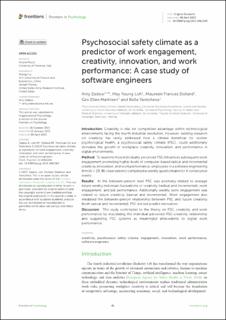| dc.contributor.author | Zadow, Amy | |
| dc.contributor.author | Loh, May Young | |
| dc.contributor.author | Dollard, Maureen Frances | |
| dc.contributor.author | Mathisen, Gro Ellen | |
| dc.contributor.author | Yantcheva, Bella | |
| dc.date.accessioned | 2023-09-11T12:42:34Z | |
| dc.date.available | 2023-09-11T12:42:34Z | |
| dc.date.created | 2023-04-06T10:22:35Z | |
| dc.date.issued | 2023-04 | |
| dc.identifier.citation | Zadow, A., Loh, M.Y., Dollard, M.F., Mathisen, G.E., Yantcheva, B. (2023) Psychosocial safety climate as a predictor of work engagement, creativity, innovation, and work performance: A case study of software engineers. Frontiers in Psychology, 14 | en_US |
| dc.identifier.issn | 1664-1078 | |
| dc.identifier.uri | https://hdl.handle.net/11250/3088676 | |
| dc.description.abstract | Introduction: Creativity is vital for competitive advantage within technological environments facing the fourth industrial revolution. However, existing research on creativity has rarely addressed how a climate beneficial for worker psychological health, a psychosocial safety climate (PSC), could additionally stimulate the growth of workplace creativity, innovation, and performance in digital environments.
Method: To examine how individually perceived PSC influences subsequent work engagement promoting higher levels of computer-based radical and incremental creativity, innovation, and work performance, employees in a software engineering firm (N = 29, 86 observations) completed a weekly questionnaire for 4 consecutive weeks.
Results: At the between-person level PSC was positively related to average future weekly individual fluctuations of creativity (radical and incremental), work engagement, and job performance. Additionally weekly work engagement was related to future creativity (radical and incremental). Work engagement also mediated the between-person relationship between PSC and future creativity (both radical and incremental). PSC did not predict innovation.
Discussion: This study contributes to the theory on PSC, creativity, and work performance by elucidating the individual perceived PSC-creativity relationship and suggesting PSC systems as meaningful antecedents to digital work performance. | en_US |
| dc.language.iso | eng | en_US |
| dc.publisher | Frontiers Media S.A | en_US |
| dc.rights | Navngivelse 4.0 Internasjonal | * |
| dc.rights.uri | http://creativecommons.org/licenses/by/4.0/deed.no | * |
| dc.subject | organisasjonspsykologi | en_US |
| dc.title | Psychosocial safety climate as a predictor of work engagement, creativity, innovation, and work performance: A case study of software engineers | en_US |
| dc.type | Peer reviewed | en_US |
| dc.type | Journal article | en_US |
| dc.description.version | publishedVersion | en_US |
| dc.rights.holder | © 2023 Zadow, Loh, Dollard, Mathisen and Yantcheva. | en_US |
| dc.subject.nsi | VDP::Samfunnsvitenskap: 200::Psykologi: 260::Organisasjonspsykologi: 268 | en_US |
| dc.source.pagenumber | 19 | en_US |
| dc.source.volume | 14 | en_US |
| dc.source.journal | Frontiers in Psychology | en_US |
| dc.identifier.doi | 10.3389/fpsyg.2023.1082283 | |
| dc.identifier.cristin | 2139629 | |
| cristin.ispublished | true | |
| cristin.fulltext | original | |
| cristin.qualitycode | 1 | |

